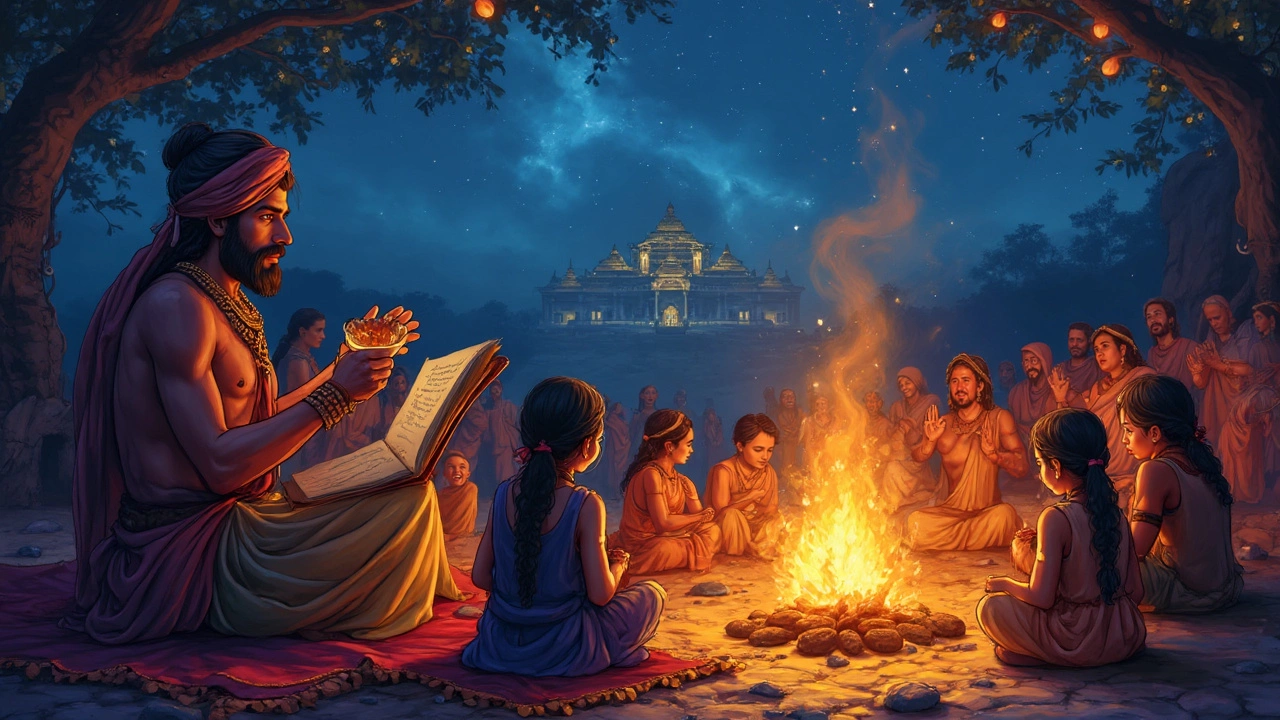Mythology Genre Explained: What Makes Mythological Fiction Stand Out?
 Jun, 9 2025
Jun, 9 2025
Ever wonder what it means when a book is called “mythology”? Some folks think it’s just old gods with lightning bolts, but there’s way more to it than that. Mythological fiction is a whole genre that takes classic myths—stuff our ancestors actually believed—and gives them a fresh spin for today’s readers. Think of it as remixing ancient stories for the modern world, with a bit of magic, adventure, and sometimes even humor thrown in.
If you’re picking your next read or figuring out what to write, it really helps to know what sets this genre apart. Sure, there’s usually something supernatural in the mix, but it’s not just about monsters and battles. Mythological fiction digs into why those stories lasted so long in the first place: the big questions, the wild adventures, and the strange ways the old gods meddled in human lives. Whether it’s set in ancient Greece or a futuristic city with old legends woven in, what matters is the way myth shapes the whole story.
- What Counts as Mythological Fiction?
- How Mythological Fiction Differs from Other Genres
- Popular Examples and Surprising Facts
- Tips for Readers and Writers
What Counts as Mythological Fiction?
When people ask what makes mythological fiction different from, say, regular fantasy or historical novels, it all comes down to the way it uses myths. In simple terms, a story counts as mythological fiction if it’s based on a real myth—or if it totally invents new ones in the style of old legends. The characters might be gods, monsters, or heroes pulled straight from ancient stories, or they might be new people who live in a world shaped by those old beliefs.
One common thing in mythology fiction is taking gods or legends (like Zeus, Thor, or Anansi) and imagining how they’d act in a modern, futuristic, or slightly twisted version of the world. Some stories retell classic myths as they were told thousands of years ago, but most mix things up. Authors might bring ancient Greek monsters into a high school, drop Norse gods into the middle of city traffic, or explore untold side-stories of minor deities.
The best part? It doesn’t matter which part of the world the myth comes from. You can have Egyptian, Japanese, Hindu, Native American, or Yoruba myths. Some authors dig into local legends and bring out characters few readers have seen before. Others use big-name stories that feel familiar but still find ways to make them surprising.
Not sure if a book counts as mythological fiction? Here are some things to look for:
- The central plot ties back to a real-world myth or legend.
- Characters include gods, mythological creatures, legendary heroes, or monsters—either classic or totally new.
- The world follows rules, logic, or traditions found in old myths and folktales.
- The main conflict often centers on powers, quests, or tests straight out of mythology.
Just to compare, check out how mythological fiction stacks up next to other genres:
| Genre | Main Feature | Common Examples |
|---|---|---|
| Mythological Fiction | Directly inspired by or based on explicit myths and legends | "Percy Jackson," "Circe," "American Gods" |
| Fantasy | Features magic or made-up worlds, but not always based on real myths | "Harry Potter," "Lord of the Rings" |
| Historical Fiction | Focuses on real events in history, mostly avoids supernatural | "The Book Thief," "Wolf Hall" |
So if a story has one foot in old myths and the other in creative storytelling, it fits squarely in this genre. The best mythological fiction is clever about how it blends the ancient with the new, helping readers connect with myths in a way that feels personal, not like they’re just reading a textbook.
How Mythological Fiction Differs from Other Genres
Picking up a fantasy novel, you might find dragons or magic. Now grab a mythological fiction book—it’s got more than just cool creatures. The heart of mythological fiction is the retelling or reimagining of ancient myths and legends. The main stories and characters usually come from real myth systems, like Norse myths, Greek legends, or Hindu epics, but with a twist or fresh angle.
The big difference is where the roots of the story come from. Most fantasy worlds are fully made up. Think of wizards or invented lands with zero ties to our history. Mythology pulls right from humanity’s oldest attempts to make sense of the world. These stories have been passed down for centuries, sometimes even longer. They’re about how the world was created, what the gods were up to, and why humans have certain traditions.
One thing that really sets mythological fiction apart is its sense of legacy. These books usually make you feel connected to something ancient, even as the action races ahead. As Rick Riordan, one of the most popular names in the genre, put it:
"The stories of mythology are timeless. No matter how much time passes or how the world changes, those stories speak to us because they touch something core about being human."
Another thing: mythological fiction often blends real history with fantasy. Here’s a simple look at how it stacks up against some other genres:
| Genre | Main Source Material | Supernatural Elements | Setting |
|---|---|---|---|
| Mythological Fiction | Classic myths/legends | Yes, based on ancient beliefs | Often rooted in real cultures & eras |
| Fantasy | Original inventions | Yes, unlimited | Usually totally made up |
| Historical Fiction | Actual history | No (usually) | Past, real world |
If you pick up books like "American Gods" by Neil Gaiman, you’ll see modern life mixed with old gods from a bunch of myth systems. In contrast, Tolkien’s "The Lord of the Rings" draws on mythology but creates a whole new world with new rules and gods. That’s the split: mythological fiction updates what’s already a big part of our shared culture, while fantasy makes up new worlds from scratch.
One last tip: If you want to spot mythological fiction, look for character names and backstories pulled straight from legends. You’ll often find gods, monsters, and magic patterns that track back to old folklore, not just a writer’s imagination.

Popular Examples and Surprising Facts
Mythological fiction shows up way more often than most people think. The Percy Jackson series by Rick Riordan is huge—even folks who aren't usually into ancient stories know about the kid with a sword and some very bad luck with Greek gods. If you look at bestseller lists, these books stayed near the top for years, with over 180 million copies sold worldwide. The series even kicked off spinoffs digging into Roman, Norse, and Egyptian myths.
Another big player? Neil Gaiman’s "American Gods". Instead of sticking to just European myths, he tosses together gods from all over—Norse, African, Slavic, and more—living in today’s America and struggling to fit into a world that’s kinda forgotten them. This book grabbed tons of awards and was turned into a TV show. It helps show how the mythology genre can get weird, creative, and very relatable.
You also get myth-based stories in places people don’t expect: Marvel Comics rebooted Thor from Norse legends and watched him become a box office hero worldwide. Same idea, just way more explosions.
Here’s a quick snapshot of just how much influence mythological fiction has had:
| Title | Myth Source | Copies Sold/Reach | Medium |
|---|---|---|---|
| Percy Jackson (series) | Greek/Roman | 180M+ copies | Books, film, TV |
| American Gods | World Myths | Over 1M copies | Book, TV |
| Thor (Marvel Comics/MCU) | Norse | Global (film franchise earns billions) | Comics, film, TV |
One weird fact: even some video games get in on this. The "God of War" franchise started with Greek myths and then jumped into Norse legends, selling over 50 million units. Turns out, people love smashing monsters almost as much now as they did thousands of years ago.
Don’t think these stories are old news, either. Publishers keep betting big on myth-based fiction, especially with readers who want to see their own cultural stories brought to life. There's a real push to show off myths from beyond just the Greek and Norse classics, like Hindu, Chinese, or West African legends. That means the genre is only getting richer and more interesting.
Tips for Readers and Writers
Mythological fiction might sound intimidating at first, but once you know what to look for, it’s seriously rewarding. Whether you’re in it for a good story or searching for writing inspiration, here are a few things to keep in mind.
- If you’re new to mythology stories, start with authors who blend old myths with fresh twists—like Rick Riordan or Neil Gaiman. These folks make ancient tales super approachable.
- Want to spot mythological fiction quickly? Look for stories with gods, magical creatures, or quests that riff on well-known legends. But don’t just expect Greek myths—there’s been a big rise in books that tap into African, Hindu, and Norse traditions too.
- Writers should always check the core myth—don’t just wing it. Readers love a creative retelling, but they can tell if you’re making stuff up that totally ignores the source. A little research on the original legends pays off big time.
- Don’t overload your story with info dumps. Let the myth sneak in through action, cool details, or side characters. This keeps the pacing lively and the world believable.
- Mixing genres works great! You can fuse myth with sci-fi or fantasy—like Madeline Miller did with “Circe” or like how Marvel movies play fast and loose with Norse gods. The point is to respect the original vibe, but don’t be afraid to play around.
If you’re curious how much people love this genre, check out these stats:
| Book/Series | Type of Mythology | Copies Sold (Approx.) |
|---|---|---|
| Percy Jackson & the Olympians | Greek | 180 million |
| American Gods (Neil Gaiman) | Mixed world myths | Over 1 million |
| The Kane Chronicles | Egyptian | 14 million |
One last tip: if you’re writing, don’t feel stuck with the classics. There’s a huge audience hungry for fresh mythologies—maybe ones from your own background or lesser-known cultures. If you’re reading, don’t shy away from new voices or settings; sometimes the best twist on familiar legends comes from a place totally unexpected. And if you ever get stuck, a quick spin through an old myth collection can spark ideas for days.